高考英语单项选择题解题方法
图片预览
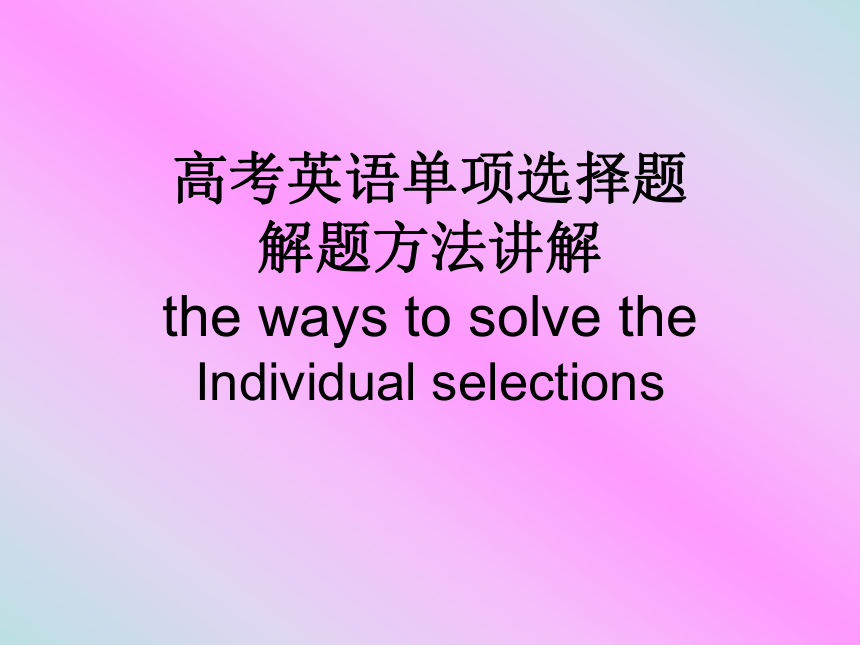
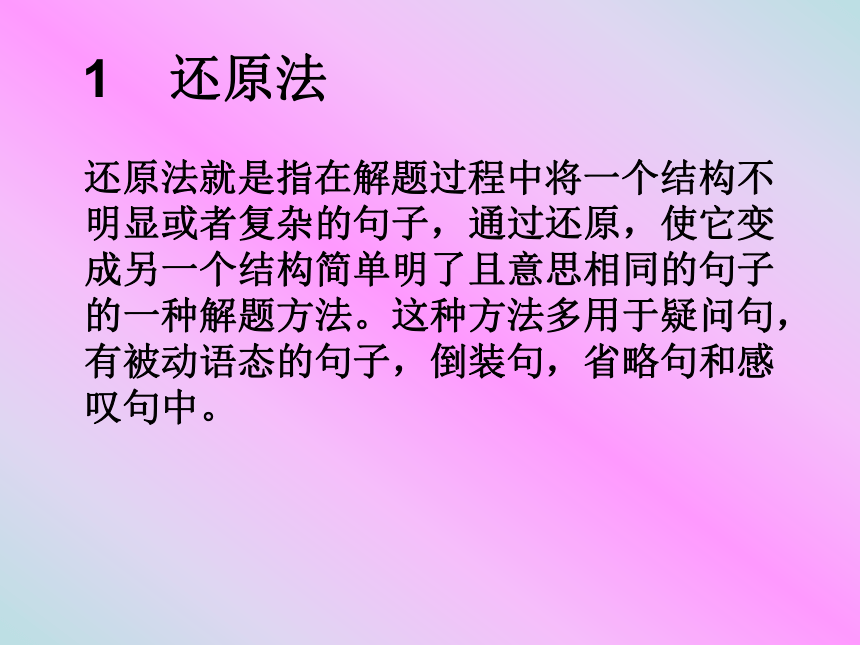
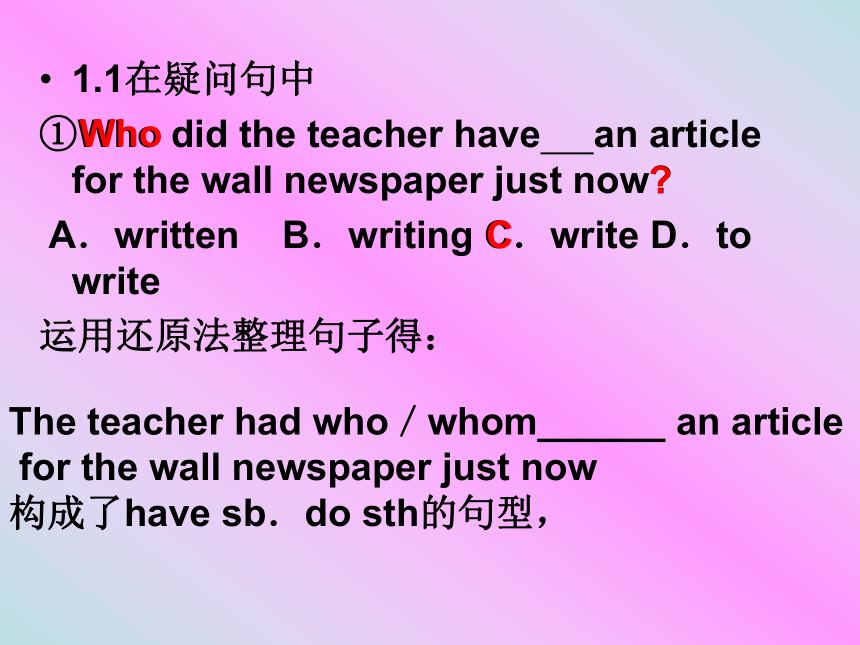
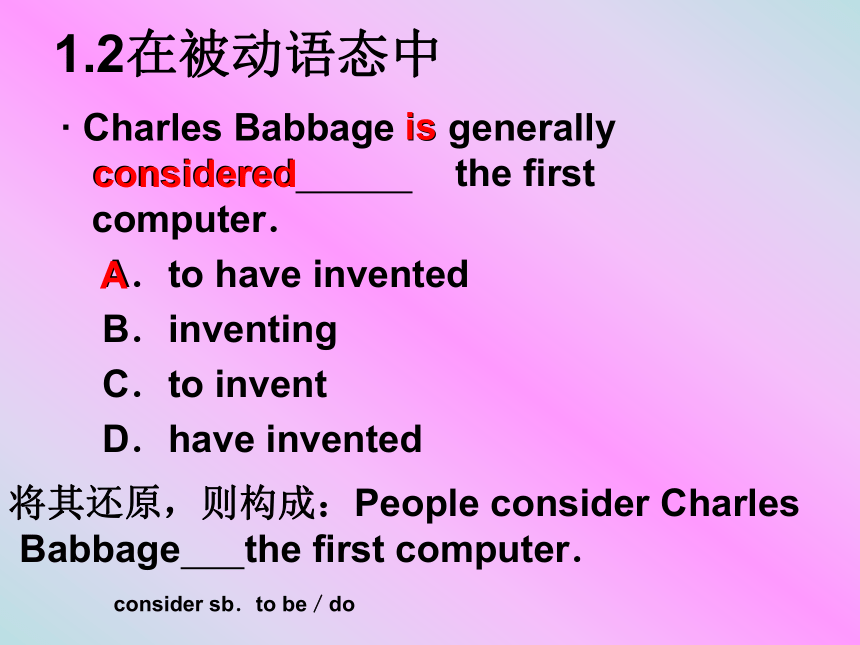
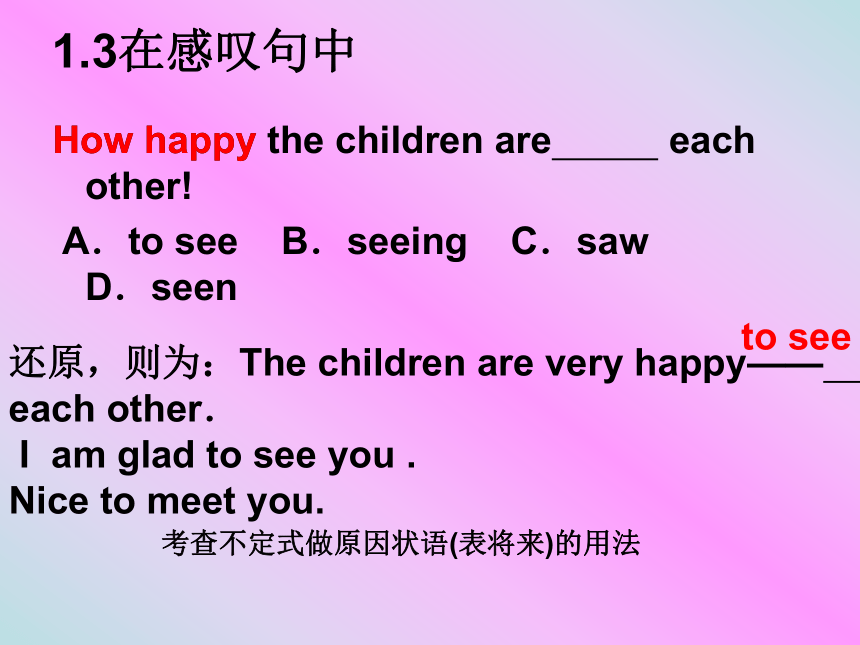
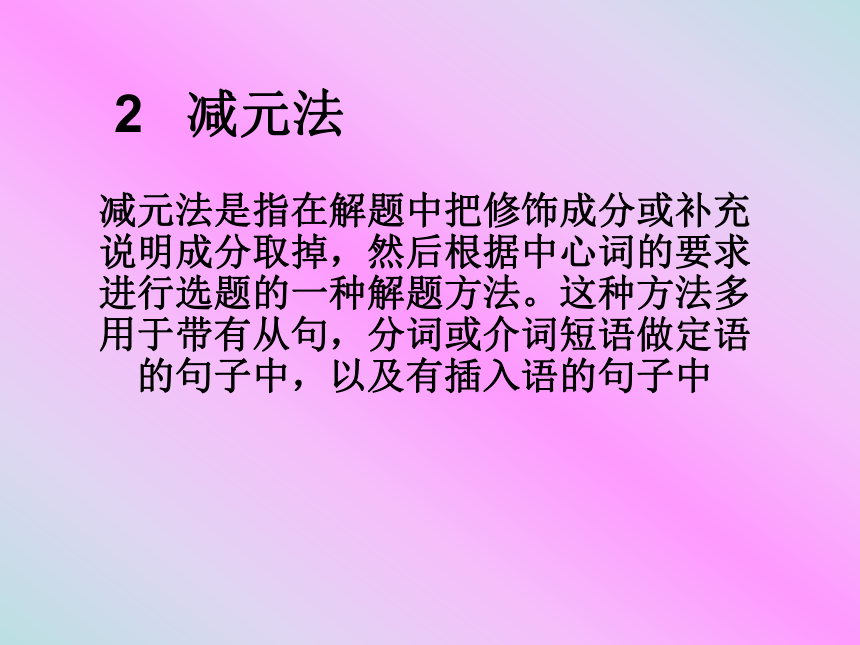
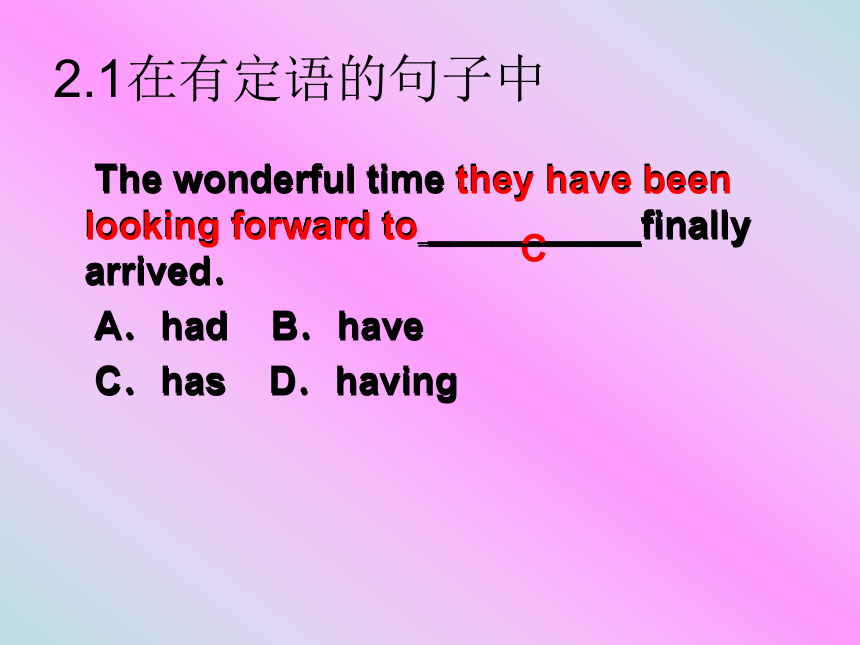
文档简介
课件19张PPT。高考英语单项选择题
解题方法讲解
the ways to solve the Individual selections 1 还原法 还原法就是指在解题过程中将一个结构不明显或者复杂的句子,通过还原,使它变成另一个结构简单明了且意思相同的句子的一种解题方法。这种方法多用于疑问句,有被动语态的句子,倒装句,省略句和感叹句中。 1.1在疑问句中
①Who did the teacher have an article for the wall newspaper just now?
A.written B.writing C.write D.to write
运用还原法整理句子得:The teacher had who/whom______ an article
for the wall newspaper just now
构成了have sb.do sth的句型, Who?C1.2在被动语态中
· Charles Babbage is generally considered the first computer.
A.to have invented
B.inventing
C.to invent
D.have invented将其还原,则构成:People consider Charles
Babbage the first computer. consider sb.to be/do isconsideredA 1.3在感叹句中 How happy the children are each other!
A.to see B.seeing C.saw D.seen还原,则为:The children are very happy——
each other.
I am glad to see you .
Nice to meet you.考查不定式做原因状语(表将来)的用法 to seeHow happy2 减元法减元法是指在解题中把修饰成分或补充说明成分取掉,然后根据中心词的要求进行选题的一种解题方法。这种方法多用于带有从句,分词或介词短语做定语的句子中,以及有插入语的句子中 2.1在有定语的句子中 The wonderful time they have been looking forward to __________finally arrived.
A.had B.have
C.has D.havingC The wonderful time they have been looking forward to __________finally arrived.
A.had B.have
C.has D.having2.2 有插入语的句子 --- I haven’t heard from Henry for a long time.
---What do you suppose to him?
A. was happening
B. to happen
C. has happened
D. had happeneddo you suppose3 增元法 增元法是指在解题过程中,将句子中省略的成分补全,或者在不变句意的情况下增加句子的某些成分,使句子结构更明显,从而使试题简单化的一种解题方法。
When _____what his name was, the boy did not answer.
A asked B asking C to ask D ask试将此题省略成分补全则为:
When the boy was asked what his name
was, the boy did not answer.
A4 暗示法
暗示法就是指在解题过程中,利用题中直接或间接的已知条件进行充分挖掘,利用题中的暗含信息进行选题的一种解题方法。
Wait till you are more ,it’s better to be sure than sorry.
A.inspired B.satisfied
C.Calm D. certainit’s better to be
sure than sorry5 对照法
对照法是根据前后句或上下文的已知条件,依据对等性原则,前后或上下文对照得出未知项的一种解题方法。
e.g.
He set out soon after dark __ home an hour later.
A. arriving B. to arrive
C. having arrived D. and arrivedThe purpose of new technologies is to make life easier, ____ it more difficult.
A. not make B. not to make
C. not making D. don't make6. 替换法
替找法是指在解题过程中,用已知条件替换未知条件,从而使试题结构变得清楚,意思明显的一种解题方法。
--- What do you think made Mary so upset?
--- her new bike,(97’上海)
A.As she lost B.Lost
C.Losing D.Because of losing CWhat7 排除法 排除法是指在解题过程中,根据题干的结构,意义及语境等搭配要求,排除不符合的选项,从而达到解题目的一种解题方法。 ------I went to shanghai by train last year?
------ why not _____there by boat for a
change this time?
A to try going B try going
C to try to go D try to goWhy not do 为什么不?8. 代入法
在做题过程中,遇到选项过多,或是选项较长,
影响我们对句子正常理解时,采用代入法可以帮
我们理解语句的结构、语义。
e.g.
I came back not _____ the rain, but _____
I was tired. A. because; because?????? ?
B. because of; because of C. because; because of???
? D. because of; because
exercises1. It wasn’t until nearly a month later ______
I received the manager’s reply.
A.since B.when C.as D.that 2.The storm left, a lot of damage to this area.
A.caused B.to have caused
C.to cause D.having caused 3. ----I stayed at a hotel while in New York.
----Oh,did you?You _____ with Barbara.A. could have stayed B. could stay
C. would stay D. must have stayed 4. Was it ___she heard with her ears __ really made her frightened?
A. what; that B. because; that
C. that; which D. what; /
5. How pleased the Emperor was ______ what the cheats said!
A. hearing B. heard C. hear D. to hear6._____do bring May flowers.
A.April showers
B.Showers of April
C.April’s showers
D.Showers April7._______, Mother will wait for him to
have dinner together. A. However late is he?????????
B. No matter how he is late? C. No matter how is he late????
D. However late he is 8. Be careful when _____ the street.
A cross B crossing
C crossed D to cross
9. ____ is no possibility __ Jack will win the first
place in the competition.
A there ; that B it ; that
C there; whether D it ; whether 10. The reason _____ my being late for school
yesterday morning is _____ there was
something wrong with my bike on my way
to school and I had to have it repaired. ?A. why; that?? B. that; why??
?C. for; that? ??D. for; why 11. If you are planning to spend your money having fun this week, better ___ it ----you've got some big bills coming.
A. forget B. forgot
C. forgetting D. to forget
①Who did the teacher have an article for the wall newspaper just now?
A.written B.writing C.write D.to write
运用还原法整理句子得:The teacher had who/whom______ an article
for the wall newspaper just now
构成了have sb.do sth的句型, Who?C1.2在被动语态中
· Charles Babbage is generally considered the first computer.
A.to have invented
B.inventing
C.to invent
D.have invented将其还原,则构成:People consider Charles
Babbage the first computer. consider sb.to be/do isconsideredA 1.3在感叹句中 How happy the children are each other!
A.to see B.seeing C.saw D.seen还原,则为:The children are very happy——
each other.
I am glad to see you .
Nice to meet you.考查不定式做原因状语(表将来)的用法 to seeHow happy2 减元法减元法是指在解题中把修饰成分或补充说明成分取掉,然后根据中心词的要求进行选题的一种解题方法。这种方法多用于带有从句,分词或介词短语做定语的句子中,以及有插入语的句子中 2.1在有定语的句子中 The wonderful time they have been looking forward to __________finally arrived.
A.had B.have
C.has D.havingC The wonderful time they have been looking forward to __________finally arrived.
A.had B.have
C.has D.having2.2 有插入语的句子 --- I haven’t heard from Henry for a long time.
---What do you suppose to him?
A. was happening
B. to happen
C. has happened
D. had happeneddo you suppose3 增元法 增元法是指在解题过程中,将句子中省略的成分补全,或者在不变句意的情况下增加句子的某些成分,使句子结构更明显,从而使试题简单化的一种解题方法。
When _____what his name was, the boy did not answer.
A asked B asking C to ask D ask试将此题省略成分补全则为:
When the boy was asked what his name
was, the boy did not answer.
A4 暗示法
暗示法就是指在解题过程中,利用题中直接或间接的已知条件进行充分挖掘,利用题中的暗含信息进行选题的一种解题方法。
Wait till you are more ,it’s better to be sure than sorry.
A.inspired B.satisfied
C.Calm D. certainit’s better to be
sure than sorry5 对照法
对照法是根据前后句或上下文的已知条件,依据对等性原则,前后或上下文对照得出未知项的一种解题方法。
e.g.
He set out soon after dark __ home an hour later.
A. arriving B. to arrive
C. having arrived D. and arrivedThe purpose of new technologies is to make life easier, ____ it more difficult.
A. not make B. not to make
C. not making D. don't make6. 替换法
替找法是指在解题过程中,用已知条件替换未知条件,从而使试题结构变得清楚,意思明显的一种解题方法。
--- What do you think made Mary so upset?
--- her new bike,(97’上海)
A.As she lost B.Lost
C.Losing D.Because of losing CWhat7 排除法 排除法是指在解题过程中,根据题干的结构,意义及语境等搭配要求,排除不符合的选项,从而达到解题目的一种解题方法。 ------I went to shanghai by train last year?
------ why not _____there by boat for a
change this time?
A to try going B try going
C to try to go D try to goWhy not do 为什么不?8. 代入法
在做题过程中,遇到选项过多,或是选项较长,
影响我们对句子正常理解时,采用代入法可以帮
我们理解语句的结构、语义。
e.g.
I came back not _____ the rain, but _____
I was tired. A. because; because?????? ?
B. because of; because of C. because; because of???
? D. because of; because
exercises1. It wasn’t until nearly a month later ______
I received the manager’s reply.
A.since B.when C.as D.that 2.The storm left, a lot of damage to this area.
A.caused B.to have caused
C.to cause D.having caused 3. ----I stayed at a hotel while in New York.
----Oh,did you?You _____ with Barbara.A. could have stayed B. could stay
C. would stay D. must have stayed 4. Was it ___she heard with her ears __ really made her frightened?
A. what; that B. because; that
C. that; which D. what; /
5. How pleased the Emperor was ______ what the cheats said!
A. hearing B. heard C. hear D. to hear6._____do bring May flowers.
A.April showers
B.Showers of April
C.April’s showers
D.Showers April7._______, Mother will wait for him to
have dinner together. A. However late is he?????????
B. No matter how he is late? C. No matter how is he late????
D. However late he is 8. Be careful when _____ the street.
A cross B crossing
C crossed D to cross
9. ____ is no possibility __ Jack will win the first
place in the competition.
A there ; that B it ; that
C there; whether D it ; whether 10. The reason _____ my being late for school
yesterday morning is _____ there was
something wrong with my bike on my way
to school and I had to have it repaired. ?A. why; that?? B. that; why??
?C. for; that? ??D. for; why 11. If you are planning to spend your money having fun this week, better ___ it ----you've got some big bills coming.
A. forget B. forgot
C. forgetting D. to forget
